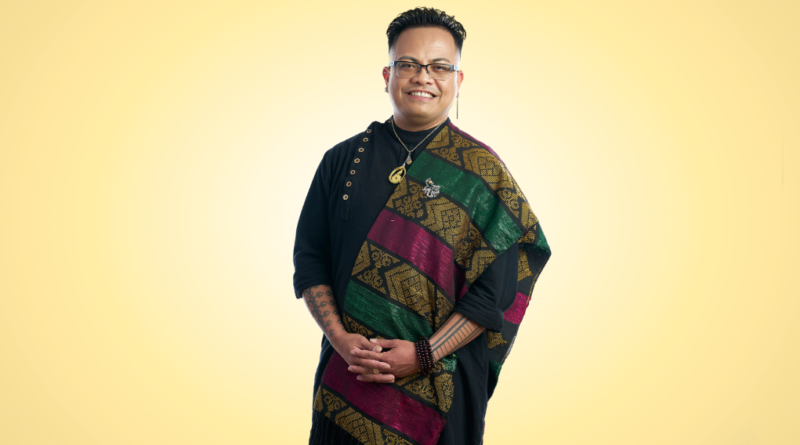Joseph Allen “JoJo” Ruanto-Ramirez: Southwestern College Assistant Professor of Ethnic Studies – Asian American Studies
By JP Emerson
Please tell us about yourself?
I am a Queer, Indigenous Asian American scholar activist who came to the United States as a natural disaster refugee from the Philippines. I am an mixed Indigenous Person from the Philippines whose mother is Sambali, Sambali-Ita, and Iranun, and whose father is Ilokano, Ifugao, and Chinese. I received my BA in Ethnic Studies from UC San Diego, my MA in Sociological Practice from CSU San Marcos, and currently a PhD candidate in Cultural Studies – American Studies at Claremont Graduate University. I became a tenured track faculty at Southwestern College in Fall 2022 directing the Asian American Studies Program. I work closely with San Diego Asian & Pacific Islander Coalition, the Igorot community of San Diego – BIBAK, Lao American Organization of San Diego (LAOSD), Khmer American Mutual Association (KAMA), Asian Business Association, National Association of Asian Professionals, California Association of Asian & Pacific Leaders in Education, and Queer Asian, Pacific Islander, Middle Eastern, Desi American – QAPIMEDA. I currently serve as Commissioner for Asian & Pacific Islander Relations for the County of San Diego Leon L. Williams Human Relations Commission, chair of the San Diego Unified School District’s Ethnic Studies Advisory Committee, and chair of the San Diego County Office of Education’s Asian American & Pasifika Advisory Committee.
Please explain the importance of celebrating and being aware of Asian American Pacific Islander Heritage Month?
Heritage is one thing; history and contemporary issues is another. It is important that being Asian American and/or Pacific Islander is more than just cultural productions such as dance, attire, and food, but also how we translate culture in diaspora while at the same time, create culture here. Culture is never stagnant – it is always negotiated, evolving, being deconstructed, reconstructed, and is consistently changing.
Can you talk about the intersectionality of AAPI heritage and LGBTQ+ identification?
Gender identity and sexuality has always been part of our diverse communities, while often in the periphery in social settings and with family or community, I empower those in the margins to come and visible, be heard, be known in spaces and places where we are often told to “know our place.” It is interesting to look at how we look at race and intersectional, but suspending our identities into particular months can be very problematic. February is Black History Month and we rarely talk about Asian American and Black solidarity, nor about mixed races families in our communities, and very few know about the Polynesian Panthers or the queer relationships between Black and Asians. March is Women’s Herstory month, yet we rarely address trans and non-Western constructed Asian and Pacific Islanders like the mahu of Hawai’i, the Faafafine of Samoa, the Bakla of the Philippines, the waria of Indonesia, the khatoy of Thailand, or the hijras of India. April is Arab American Heritage Month, where they are considered West Asians by the United Nations, but their race gets complicated in the United States – whereas a Syrian refugee is considered Asian when coming to the United States, but the minute they become an American citizen, they become White. Our identities have always been complex and being queer does not meet it makes it more complicated, on the contrary, it is about making sure that when we talk about AAPI, we address all our complexities and identities.
Any recommendations for individuals wanting to know more about AAPI Heritage?
Do not get stuck on social media to get to know culture and identity, history, or contemporary issues. For students, take an Asian American or Ethnic Studies class. One should look at their local libraries and community programming calendars and attend workshops, seminars, and public events whether it be online or in person. If there are events in community, like heritage events, try to attend. More importantly, when there is a social movement around social injustices, be an ally or a co-conspirator, participate, demand for change. AAPI heritage is rooted in struggle and liberation.
The importance of LGBTQ+ visibility in the AAPI community?
Queer visibility does not only been the visibility of bodies or even voices, but we must also be seen in our history books, children’s books, media, and overall curriculum. My goal is to make sure these intersectionalities are in our school, and that is why at Southwestern College, I am making the first Asian American Gender & Sexuality course in any of the community colleges in the state.
How can people connect with you?
My social media – ProfessorSwoosh or by bringing me to community events and other classes.


Pingback: Celebrating AAPI Heritage Month – The Word SD